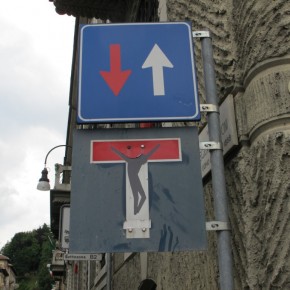Making my way through the vastness of my local Costco, trying to avoid the urge to buy large quantities of things for which I have small need, I was surprised to catch a glimpse of huge plastic barrels of flour out of the corner of my eye.
“Wait,” I thought, “Didn’t I just see a row of flour sacks two aisles back?” As I turned my head to ponder this riddle, I saw that the flour was grouped next to huge containers of dried strawberries and, a little farther to the right, such staples as powdered milk and eggs. And that’s when I realized that this particular section was grouped by impulse, not commodity. I’d stumbled into a survivalist’s general store.
Given the fact that our local Costco is located near a large Mormon community, the emphasis on getting by in hard times was not a total shock. After all, many Mormons continue to follow in their ancestors footsteps, stockpiling bulk goods in the event of war, famine or — as unlikely as it may seem right now — targeted discrimination of the sort their faith suffered in the 1800s.
But as I inspected the range of end-time offerings more closely, it became apparent that old habits had been repackaged for a world in which it’s not just Mormons who feel the need to prepare for the worst. Between all the violent weather the United States has experienced recently, the political upheavals in Europe and the MIddle East and the generally pessimistic outlook for the “middle” middle class from which Costco draws the bulk of its customers, a switch has been flicked in enough minds to justify marketing the post-civilization lifestyle.
The Rapture may once again have failed to arrive as prophesied, but enough people have imagined themselves having to make do without the technological and institutional support of modern societies that it makes economic sense to take financial advantage of their fears. That’s the genius of capitalism. You can make a profit on just about anything, including the specter of its abolition.






Here in Europe, we’ve got killer cucumbers (or sprouts, or whatever evil veggie features in your private fantasies) on the loose. The Euro is slowly imploding, and we Germans are readying themselves to emit 400 million extras tons of carbon per year – see, we’ve got killer atomic plants too. Like the fear of God, the irrational fear of nuclear power must be assuaged too, and damn the climate consequences.
It’s enough to drive the sensible European to drink. For now. But fear not: evangelical churches are making big inroads here too, and soon we’ll have the American mix of puritanism, irrationality, intolerance and bigotry to contend with. Survivalist gear can’t be far behind.
Are American-style Protestant churches — aside from the Mormons, of course — really making such dramatic inroads? That’s a development I hadn’t heard about. If you can think of sources where I can read up on this trend, let me know.
Yes, the most unsettling item of human psychology (or is it modern, western psychology) is a macho itchy trigger-finger, that will go to expensive and useless war for any reason or for no reason — in an instant; but will not respond to the most major dangers even over a space of many years of warnings by highly esteemed scientists.
By now, all the world should have achieved at least 10% non-fossil-fuel electric generation. But, instead, we’ve gone toward minus-10% NFFEG (that is, we’ve increased our use of FFs).
Many American Indian tribes have linguistic and cultural patterns by which one who is dying says gently to his friend, “You stay, I go.” It seems that, today, all of humankind should — to the ants and cockroaches and bacteria and planktons — be saying (and meaning!) “You stay, and we go.”
The willingness to go to war, but not to deal with potentially graver problems of our own creation is definitely one of the oddest and most upsetting aspects of human psychology.